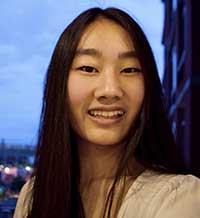
Student Fellow Stories: Diane Zhang
 Diane Zhang is the Data-Driven Sustainability Reporting Student Fellow and a sophomore at MIT majoring in Computer Science and Molecular Biology with a Spanish minor on the pre-medicine track. She is working with MITOS to create a data-driven campus sustainability report that captures the Institute’s progress on its sustainability impact areas and to inspire actionable change. She hopes to incorporate environmental awareness in
Diane Zhang is the Data-Driven Sustainability Reporting Student Fellow and a sophomore at MIT majoring in Computer Science and Molecular Biology with a Spanish minor on the pre-medicine track. She is working with MITOS to create a data-driven campus sustainability report that captures the Institute’s progress on its sustainability impact areas and to inspire actionable change. She hopes to incorporate environmental awareness in
all her engagements and is specifically interested in understanding MIT’s role in creating a sustainable future. Besides her position at MITOS, Diane performs bioinformatics research at the Broad Institute of MIT and Harvard working with metastatic breast cancer data.
What was your favorite project/ story/ assignment/ event that you worked on in your time as a Student Fellow? Why?
During my time as a Student Fellow, I have focused on creating the Data-Driven Sustainability Report. Within the report, working on the Material Lifecycles section where we analyzed waste patterns at the Institute over time and by building was particularly meaningful. This related to my previous experience measuring contamination of trash in recycling for a pilot experiment with Waste Watchers. However, instead of collecting data in-person, with MITOS, I had the opportunity to study the more comprehensive picture of waste at MIT. For me, it was important to observe from the data the large extent of waste contamination in recycling containers, and consider how this information might apply to future actions (such as by identifying which materials contributed most to this contamination). Another unique aspect of analyzing trends over time was to see how waste patterns changed (or which remained the same) pre- and post-MIT policies which were motivated by the pandemic (e.g., sending students home, selectively inviting students back to campus). In general, since this will be the first data-driven report, I am excited to see how reporting on these sustainability metrics may set a precedent for MIT to more thoroughly understand how its community, interactions, and practices influence its relationship with the environment.
In what ways has your experience as a MITOS Student Fellow influenced your career at MIT and/or beyond?
Although I am interested in medicine and biomedical research in the future, my experience as a MITOS Student Fellow has inspired me to incorporate and be involved in sustainability-related initiatives in whatever specific career I end up in. From looking at data on larger time and spatial scales, I have learned how effects of everyday practices accumulate and, therefore, would like to see data-backed sustainability research and solutions in the future institutions I am involved in. Working with MITOS has helped me consider how I can make sustainability a commitment for the long-term.
What advice would you give to other students to make the most out of the MITOS Student Fellowships?
The entire MITOS team is highly supportive and specialized, so I would encourage seeking feedback and discussion with both your supervisor and team members. Talking with the team exposed me to new considerations, ideas, and sources of information, from the specifics of my project to the broad consideration of social justice and equity in environmental science.

